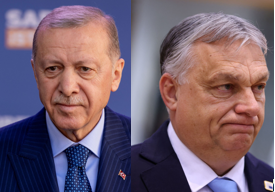Hungarian Prime Minister Viktor Orbán seems to have adopted the tactics of master haggler Tayyip Erdoğan and is keeping his cards close to his chest. Just as he did with regard to Sweden’s NATO membership, when, despite promising on numerous occasions that Budapest would not be last to ratify the new member’s accession, everyone was left waiting for Orbán’s side to complete its procedures. He is expected to openly declare his support for the Romanian, Klaus Ioannis, soon. Besides, his relations with Mark Rutte are not exactly warm; in fact, they are positively frigid.
For his part, though, the Turkish president can no longer use the excuse of the municipal elections in his country, even if the results are not what he hoped for. Ankara’s choice for the new Secretary General of the North Atlantic Alliance will be made “in the context of strategic wisdom and justice”, the Turkish presidency announced in a post on X following a phone call between Tayyip Erdoğan and Mark Rutte. Of particular interest is the fact that the post prioritizes the non-EU NATO Allies (yet again), underlining that “President Erdoğan stressed that the next Secretary-General should serve the member countries’ security and interests in the best way in terms of the fight against terror and other challenges, strengthen the Alliance’s unity and prioritize NATO’s main role, make convincing commitments in terms of the fundamental values of the Alliance and the adherence to its established practices, and take into consideration the sensitivities of the non-EU allies.”
In essence, Ankara could ask that its positions be reflected more in the part that concerns EU-NATO relations, with an eye on PESCO (Permanent Structured Cooperation in the fields of defense and security) and on the Military Mobility program, in particular. The program in question is coordinated by the Netherlands (one of the countries that already go out of their way to ensure that Turkish “sensibilities” are catered to within the EU and NATO), with Norway, the United States, Britain and Canada also participating.
Of course, safeguards have been in place since the establishment of PESCO. A fundamental precondition for a country’s participation in a program is that it must not run counter to the interests of EU Member States. In addition, the nation must both respect EU principles and values and have signed a security agreement with the EU governing the exchange of classified information.
NATO and the EU have already upgraded their cooperation compared to the past. Indeed, the NATO-EU Joint Statement of January 2023 stresses “promoting close consultation and cooperation with all NATO Allies and EU Member States”, but also encourages the fullest possible participation of non-EU NATO Allies in EU initiatives.
The target of “29” and the scenario of last-resort
We are also waiting on Sweden, which has just joined the Alliance.
Mark Rutte’s goal is to ensure he has the support of 29 of the 32 Allies by trying both to “displace” the obstacle called “Klaus Iohannis” and to secure Hungary and Turkey’s support for his candidacy. However, we cannot rule out the possibility of a third candidate capable of mustering the unanimous support required being discussed as a last resort.
But time is running out, and rather than the new Secretary General being announced at the upcoming ministerial meeting on April 3–4, some predict that Viktor Orbán may prolong the “indecisiveness” until the European Council meeting in June, while also demanding something from the EU and, in effect, coupling NATO to European issues. Of course, that would be very late, given that the NATO Summit is due to take place in Washington in July. The message given out by the constant postponements out can only please and benefit those who seek to undermine NATO and the EU.



